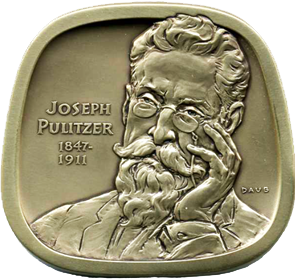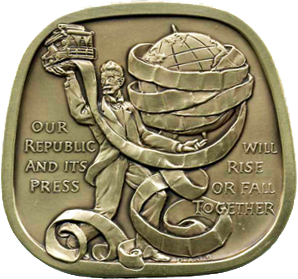 |  |
Joseph Pulitzer medal designed by Eugene Daub, struck by Medallic Art Company in quantities of 110 bronze, 63 pure silver, and 34 gold-plated silver. Obverse: Portrait, JOSEPH PULITZER 1847-1911, DAUB. Reverse: Standing figure of Pulitzer, OUR REPUBLIC AND ITS PRESS WILL RISE OR FALL TOGETHER, DAUB. 49 x 47 mm.
Joseph Pulitzer was born in Mako, Hungary on April 10, 1847. Both his parents were registered by the official Jewish registry under the heading of Religion as “Israelitic” and under Nationality as “Jewish.” In accordance with Jewish law, Joseph Pulitzer was circumcised eight days after his birth, and he likely received a traditional Jewish upbringing at Mako’s cheder (Jewish primary school).
Joseph Pulitzer arrived in Boston from Hungary in 1864 at the age of 17, his passage having been paid by Massachusetts military recruiters who were seeking soldiers for the American Civil War. Pulitzer was a part of Sheridan’s troopers, in the First New York Lincoln Cavalry in Company L., where he served for eight months.
On March 6, 1867, Pulitzer became an American citizen, and just two years later he won a seat in the St. Louis state legislature as a Republican. In 1884, Pulitzer was elected to the U.S. House of Representatives from New York as a Democrat. He served from March 4, 1885 until April 10, 1886, resigning due to the pressure of journalistic duties.
In 1879, Joseph Pulitzer bought both the St. Louis Dispatch and the St. Louis Post, merging the two papers as the St. Louis Post-Dispatch. With his own paper, Pulitzer developed his role as a champion of the common man, featuring exposés and a hard-hitting populist approach.
Putting aside serious health concerns, in 1883 Pulitzer negotiated the purchase of The New York World, which was in financial straits. Charles Dana, the editor of the rival New York Sun, attacked Pulitzer in print, using derogatory terms like “Judas Pulitzer.” Pulitzer crusaded against public and private corruption, filled the news columns with a spate of sensationalized features, made the first extensive use of illustrations, and staged news stunts. In one of the most successful promotions, The World raised public subscriptions for the building of a pedestal at the entrance to the New York harbor so that the Statue of Liberty, which was stranded in France awaiting shipment, could be emplaced.
From 1896 to 1898, Pulitzer was in a bitter circulation battle with William Randolph Hearst’s Journal, in which there were no apparent restraints on sensationalism or fabrication of news. When the Cubans rebelled against Spanish rule, Pulitzer and Hearst both called for war against Spain after the U.S. battleship Maine mysteriously blew up and sank in Havana harbor on February 15, 1898. Congress reacted to the outcry with a war resolution. After the four-month war, Pulitzer withdrew from what had become known as “yellow journalism,” and The World became more restrained. Pulitzer waged courageous and often successful crusades against corrupt practices in government and business. He was responsible to a large extent for passage of antitrust legislation and regulation of the insurance industry.
In May 1904, writing in The North American Review in support of his proposal for the founding of a school of journalism, Pulitzer summarized his credo: “Our Republic and its press will rise or fall together. An able, disinterested, public-spirited press, with trained intelligence to know the right and courage to do it, can preserve that public virtue without which popular government is a sham and a mockery. A cynical, mercenary, demagogic press will produce in time a people as base as itself. The power to mould the future of the Republic will be in the hands of the journalists of future generations.”
The Pulitzer Prizes were established in 1917 by money bequeathed by Joseph Pulitzer to Columbia University to recognize artistic and journalistic achievements in the United States. The prizes are given annually to award achievements in American journalism and photography, as well as literature and history, poetry, music and drama. The Columbia School of Journalism opened in 1912, thanks to Pulitzer’s philanthropic bequest. Jewish Americans have won Pulitzer Prizes in many categories. Some of the winners in fiction include Bernard Melamud, Philip Roth, Neil Simon, Art Spiegelman, and Herman Wouk. Pulitzer winning Jewish American playwrights and musicians include Ira Gershwin, George S. Kaufman, Marvin Hamlisch, Arthur Miller, Richard Rodgers, Stephen Sondheim, and Wendy Wasserstein.